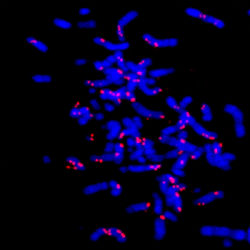Cancer-related DNA Replication During Mitosis

Researchers from the University of Copenhagen have discovered that some parts of the genome don´t replicate during S-phase, but only after entering mitosis. The genomic sites prone to replicate during cell division are called common fragile sites (CFSs), and experiment difficulties to replicate on time due to cancer-related replication stress. The finding, published in Nature, changes the canonical cell cycle model.
All students learn from their textbooks that DNA replication takes place during the S-phase of the cell cycle. However, the last study from Professor Ian D. Hickson’s team shows that there might be exceptions to the rule. In our genome there are fragile sites, conserved across species, that break easily during DNA replication. In the event of oncogene activation, these CFSs are particularly affected by the cancer-related replication stress, and might go through the S-phase without actually being able to duplicate. During the mitotic prophase, CFSs that have not replicated are targeted by MUS81–EME1 endonucleases that break the DNA. The nuclease activity triggers the recruitment of POLD3 DNA polymerase at CFSs, which completes DNA replication at those sites, thus minimizing chromosome mis-segregation or failure of sister chromatids separation.
Trying to condense DNA before mitosis
CFSs are not necessarily breaks or gaps, but compared to the rest of mitotic DNA they seem so because they are non-condensed. The authors propose that the attempt to condense the non-duplicated DNA at CFSs before mitosis is what triggers the DNA replication at these loci.
The newly discovered DNA duplication pathway is a promising therapeutic target, as many cancer cells with chromosomal instability and replicative stress show high levels of POLD3-dependent DNA replication.
Source: U. of Copenhaguen
